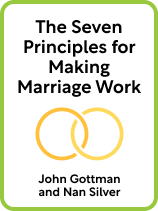

This article is an excerpt from the Shortform book guide to "The Seven Principles for Making Marriage Work" by John Gottman and Nan Silver. Shortform has the world's best summaries and analyses of books you should be reading.
Like this article? Sign up for a free trial here.
What are John Gottman’s “four horsemen of the apocalypse” in the context of a marriage? What are the major signs that your marriage is on the brink of divorce?
The “four horsemen of the apocalypse” is Gottman’s metaphor for describing communication habits indicating that a marriage is headed for divorce: criticism, contempt, defensiveness, and stonewalling. While people may resort to these from time to time in their relationship, the problem begins when they become a pattern.
Here’s how to spot if your marriage is headed for divorce, according to Gottman.
The Four Horsemen of the Apocalypse
According to relationship researcher John Gottman, the “four horsemen of the apocalypse” are the telltale warning signs that your marriage is in trouble:
1. Criticism. One spouse expresses dissatisfaction with their partner generally instead of expressing dissatisfaction about a specific issue. For example, they say, “You’re a slob,” instead of “You didn’t clean the kitchen when you said you would.”
2. Contempt. One spouse expresses dissatisfaction in a way that belittles their partner and signifies a lack of respect. For example, they might say, “I can’t believe you forgot to clean the kitchen. Are you stupid?”
3. Defensiveness. One spouse, who feels attacked by their partner, tries to protect themselves. However, this strategy backfires because it shifts responsibility onto the other partner. For example, the spouse who didn’t clean the kitchen might say, “I may have forgotten to clean the kitchen, but I cleaned the bathroom, which you never do.”
4. Stonewalling. One spouse feels overwhelmed and stops responding. (This spouse is likely feeling flooded.)
(Shortform note: The “four horsemen of the apocalypse” is a religious reference; in Christianity, four men on horses herald the end of the world. The first symbolizes Christ (or the Antichrist, depending on who you ask), the second symbolizes war, the third symbolizes famine, and the fourth symbolizes death. Just as these four signs are said to lead to the end of the world, Gottman and Silver’s four destructive communication styles can lead to the end of a marriage.)
| Handling Your Go-To Horseman Some psychologists suggest that you may have a go-to horseman when arguing with your spouse. If you’re not sure what it is, ask your spouse to help identify what damaging strategy you use when you fight. Then, consider developing techniques to resist your impulse to engage negatively with your spouse. If you tend to criticize your spouse, look within yourself to find the request underlying the criticism. If you tend to be contemptuous, watch out for and combat any negative stories you tell yourself about your spouse. If you get defensive, try active listening: Confirm with your partner what you’ve heard so you don’t try to defend yourself against perceived insults. If you tend to stonewall, learn to ask for regular breaks during fights with your spouse. |

———End of Preview———
Like what you just read? Read the rest of the world's best book summary and analysis of John Gottman and Nan Silver's "The Seven Principles for Making Marriage Work" at Shortform.
Here's what you'll find in our full The Seven Principles for Making Marriage Work summary:
- Why becoming genuine friends with your spouse is essential
- Four principles for improving your marital friendship
- The three warning signs that your marriage is in trouble






